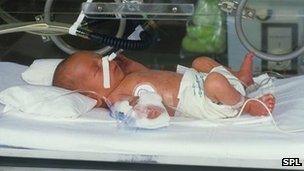Early milk feeds 'benefits premature babies'
- Published

At-risk premature babies would benefit from being given milk feeds earlier, a study has suggested.
The University of Oxford study found babies were not at a higher risk of severe bowel problems if moved off IV-feeds early, as was feared.
Four hundred babies, born at least five weeks early and small for their age, were studied for the Pediatrics paper.
The premature baby charity Bliss said it hoped the findings would lead to a change in feeding practices.
Over 60,000 babies are born prematurely every year in the UK and one in 10 babies born in the UK needs some form of special care because of problems during their birth, because of a life-threatening condition or because they were born too early.
High-risk premature babies are vulnerable to severe bowel problems, including a condition called necrotising enterocolitis (NEC). Concerns over this risk has led to special care units previously tending to delay the start of milk feeds.
But IV feeding can also cause complications, including liver problems.
The researchers behind this study, which was funded by the charity Action Medical Research, wanted to examine if underweight premature babies could take milk earlier, which would then help them gain a healthy weight sooner.
Feeding 'challenge'
The study was co-ordinated by the National Perinatal Epidemiology Unit at the University of Oxford, and carried out at 54 hospitals across UK and Ireland.
Almost half of the babies in the trial needed some help with their breathing, although really sick babies were not included.
Half of the babies were introduced to milk feeds on day two of life, while the remainder were given milk on day six.
Three quarters were given their mother's breast milk, rather than donor milk or formula.
Full feeding - defined as babies successfully taking milk feeds for 72 hours - was achieved earlier in the babies who started milk feeds on day two.
On average, babies who started milk feeds on day two of life were being fully milk fed by 18 days of age - compared with an average of 21 days of age in those who started on day six.
And the early milk feed group spent an average of 11 days in high-dependency cots, compared with 15 for the later group.
Crucially, there was no statistically significant difference in the number of babies experiencing severe bowel problems, including NEC.
In the group given early feeds, 36 (18%) developed NEC, compared with 30 (15%) of those who started later.
The authors of the paper, led by Dr Alison Leaf and Professor Peter Brocklehurst conclude that babies "would generally benefit from starting milk feeds within the first 24-48 hours after birth".
Dr Leaf, now based at the Princess Anne Hospital in Southampton, said: "These babies are a challenge to feed. Good nutrition and growth is very important, however their body organs, including the bowel, are immature.
Professor Brocklehurst, director of the Institute for Women's Health at University College London, added: "Early feeding appears to be better for these high risk babies. This research will enable more high risk premature babies to be fed early, and to achieve full feeding earlier.
"This will reduce the need for intravenous drips and infusions."
The team say their findings can be put into effect on special care baby units immediately.
Jane Abbott, from the premature baby charity Bliss said: "We welcome this research as it increases understanding about feeding practice for vulnerable babies, an area where there are known to be gaps in knowledge.
"We hope the findings will lead to changes in practice to ensure better outcomes for these babies and their families.
"Earlier discharge home not only frees up cot space but also means that the whole family can benefit as the emotional and financial stresses will be reduced."
- Published17 April 2012
- Published3 April 2012
- Published7 March 2012